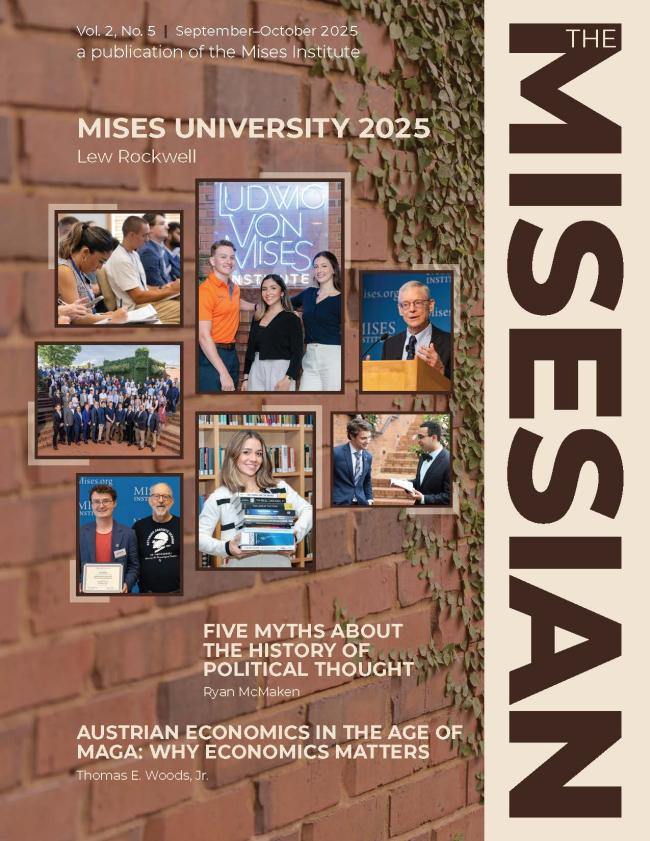- Downloads:
- TM Sept Oct 2025.pdf
In this issue of The Misesian, we want to give readers a sense of what happens at Mises University by featuring lectures and photos from the event, as well as testimonials from students.
Mises University has always been at the heart of what the Mises Institute is. We have always been, first and foremost, an academic institution, providing rigorous instruction for students, and a base of support for scholars and teachers. Students and faculty who are preserving and teaching the message of freedom and free markets often find few friends in “official” academia. Most colleges and universities, whether they are government-owned or private, are recipients of enormous amounts of government money. Not surprisingly, most are now hostile to the idea of laissez-faire and private property.
From the beginning, the Mises Institute has long sought to provide an antidote to this hostility. We protect radical faculty through our support network, allowing them to spread the truth about markets and the truth about the state.
And through Mises University, we provide a refuge for dissident students who seek a serious interpretation of economics, history, international relations, and philosophy that is based on private property and peace.
In this issue, you’ll find two lectures from this year’s Mises University. In the first, I discuss five major myths about the history of political thought, as described by the great, late historian Ralph Raico, who was a senior fellow at the Mises Institute and taught at Mises University for many years. Raico believed it was important for students to know the history of the freedom movement and to learn to discriminate between good and bad ideas among those who claim to be fighting for freedom. Not all who claim to be freedom fighters fit the description.
The second lecture comes from our Senior Fellow Tom Woods, who examines the MAGA movement’s criticisms of economists, Federal Reserve policy, and even free markets. Woods shows that adherents of the MAGA movement must learn sound economics if they hope to defend freedom and prosperity.

From the Editor—September/October 2025
In this issue of The Misesian, we want to give readers a sense of what happens at Mises University by featuring lectures and photos from the event, as well as testimonials from students.
Five Myths about the History of Political Thought
In 2004, Ralph Raico, presented a 10-hour lecture series on the history of political thought. “History: The Struggle for Liberty” presented a concise summary of the more than 400 years of political thought that underlies the political ideology of laissez-faire.
Austrian Economics in the Age of MAGA: Why Economics Matters
It’s with the advice of Austrian economists that MAGA can avoid falling into the kinds of errors that seem to create prosperity but only set the stage for recession and thereby intensify the very problems they claim to be trying to solve.
Why We Need Austrian Economics
During Mises University, Ryan McMaken interviewed Dr. Joseph Salerno on a live episode of Radio Rothbard. The topic was “What Makes the Austrian School Different?” This article is a selection from the 30-minute interview with Dr. Salerno.
Keep Your Schroeder to the Wheel
In this issue of The Misesian, we pay tribute to the great libertarian historian Ralph Raico, and in this review, I would like to discuss the views of another historian, one who was most definitely not a libertarian, but whose work Raico knew and respected.
Faculty Spotlight: Paul F. Cwik
The support network that has emerged through the Mises Institute is really important. We feel like we’re all alone, but having that support network is great because it tells you that you’re not alone, that there are other people doing the same thing, and that we’re rooting for you.
Mises University 2025
Transformative experiences are the goal of Mises University. We take undergraduate students under our wing for one week and introduce them to Austrian economics. Next year will be the 40th anniversary of Mises University, and we plan to make it unforgettable.








